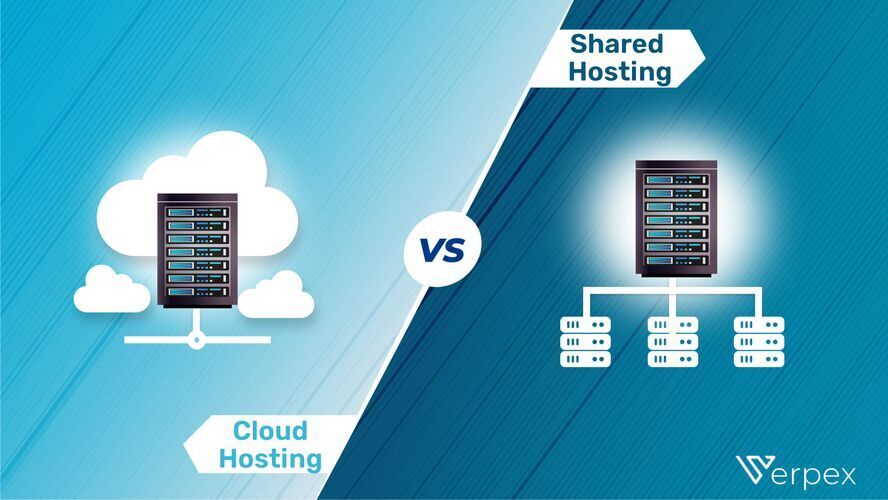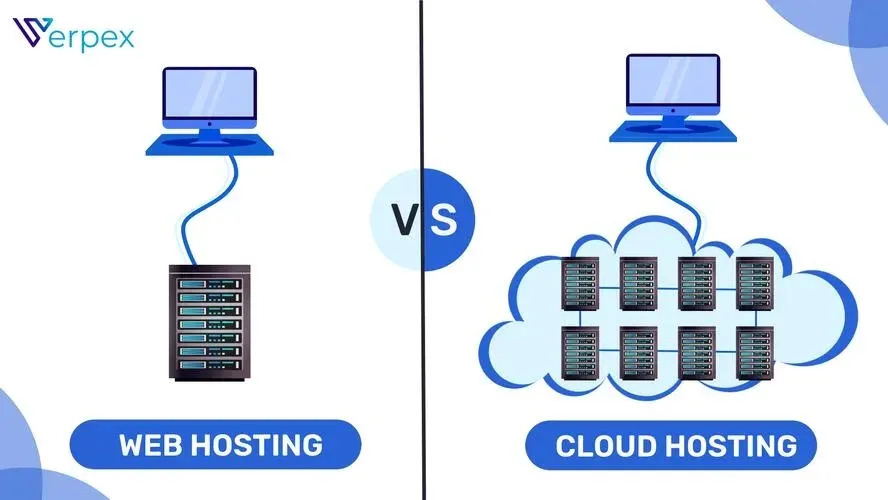If you're new to the world of web hosting it can certainly be confusing to pick your way through the different options available.
Web and cloud hosting differ mainly in how they offer hosting. We've compared them side-by-side to help you choose the best option for your website.
What Is Web Hosting?
Web hosting is the service where your website's data is stored, usually on a single server. Generally, the specific type of web hosting service you’ll need depends on your site’s storage requirements.
The most common forms of web hosting include:
What Is Cloud Hosting?
Cloud hosting allows websites to share space and resources across multiple servers in data centers.
Suppose a site gets a traffic surge, cloud hosting allows said site to easily tap into extra resources. This makes it a highly scalable hosting option.
Cloud Hosting Vs Web Hosting: An Overview
Common Features
Flexibility: Most plans allow easy upgrades or changes.
Broad coverage: Suitable for various websites, from small businesses to large e-commerce sites.
24/7 customer service: Continuous support to keep your site running smoothly.
Differences
Server infrastructure: Unlike traditional web hosting that uses a single server, cloud hosting spreads your site's load across multiple servers, reducing strain on any single resource.
Scalability: Cloud hosting offers instant access to extra processing power for handling traffic spikes. Unlike other hosting options.
Flexible Pricing: Cloud hosting providers charge based on your actual bandwidth usage.
Web hosting services usually have complex price structures.
Comparing Other Types of Web Hosting
Shared Vs. Cloud Hosting
Shared hosting is ideal for small websites due to its affordability, ease of setup, and simplicity. Cloud hosting, however, offers more processing power.


Cloud Hosting Vs. VPS
VPS hosting is ideal for skilled developers looking for optimal user control and site customizations. Cloud hosting, while user-friendly and cheaper, offers less control.
Advanced Hosting Features: SSL, CDN, and More
Websites today need advanced hosting features more than ever. Here's a quick rundown of the essentials your hosting provider should offer:
SSL Certificates: Encrypts data to protect user information.
Content Delivery Networks (CDNs): Speeds up loading times by storing content globally.
Automated Backups: Keeps your data safe without disrupting the live site.
Advanced Caching: Enhances site performance and speed.
Staging Environments: Allows safe testing before going live.
Hosting Solutions for Multiple Domains
Managing multiple websites is common in today's digital world. Multi-site hosting solutions make this easier by letting you control all your domains from one place. Here's how they help:
One Dashboard for All Sites
Control and manage multiple websites seamlessly from a single point.
Streamlined Updates & Security
Enjoy consistent updates and robust security across all your sites.
Shared Resources
Easily share themes and plugins between different websites.
Whether you're growing your online presence or simplifying your digital tasks, our multi-site hosting offers the efficiency and scalability you need.
Considerations for Switching Hosting Services

Your plan is too expensive
If your current plan is too expensive, consider switching to shared hosting. It's cost-effective for smaller websites with lower processing needs.

You’ve noticed a slow-down in your site
This means you're low on bandwidth, and power, or can't manage traffic, a cloud solution might be suitable.

You need something more scalable
If your traffic is unpredictable or you expect seasonal spikes, cloud hosting is an ideal option.

You need a lot of processing power
A dedicated server is ideal for large businesses to handle heavy traffic and provide plenty of storage.
Comparing Cloud and Web Hosting
| Criteria | Cloud Hosting | Web Hosting | Conclusion |
|---|---|---|---|
| Resource Efficiency | Cloud hosting efficiently allocates resources, smoothly handling traffic spikes by sharing processing power across multiple servers. | Web hosting operates on a single server, offering less flexibility in resource allocation compared to cloud hosting. | Cloud hosting’s adaptability to use multiple servers when needed makes it the top choice. |
| Performance | Cloud hosting usually provides reliable performance. Performance may decrease for very large businesses. | Web hosting offers a wide variety of performance standards. Each option is tailored to meet specific needs. | Web hosting caters to all performance needs, from small blogs to large corporations. |
| Traffic Volume | Cloud hosting is ideal for traffic fluctuations. Designed for both traffic spikes and drops. | Most web hosting packages require you to plan ahead for web traffic. You can choose a dedicated server for high traffic, but it's costly. | Cloud hosting offers better service value with its flexibility and affordable pricing. |
| Security Measures | Despite recent cybersecurity improvements, websites in cloud environments are often more vulnerable than other hosting types due to broader internet exposure. | Web hosting solutions provide various security options, from customizable VPS or dedicated solutions to fully managed services by the host. | Web hosting offers better security measures. With enough budget and expertise, you can achieve top-notch security. |
| User Control and Customization | Cloud hosting often limits backend control. Users may face restrictions on installing software and programs. | Shared hosting similarly restricts user control. VPS and dedicated hosting provide greater flexibility. | Web hosting provides various site customization options, depending on your package and hosting provider. However, it may require significant technical skills. |
| Server Administration and Management | Data hosts manage server administration. They ensure uptime and fix maintenance issues. Hosts apply necessary security patches. | Server administration varies by hosting package. Shared hosting includes all admin tasks. VPS and dedicated hosting require more user involvement. | It's hard to say which hosting service is better. It depends on your admin’s needs. Cloud solutions ease hosting stress, while other options allow more customization. |
| Ease of Scalability | Cloud hosting is designed for scalability. Utilizes multiple servers for instant adjustments. Scales up or down based on traffic and usage. | Web hosting often has more processing power than cloud options. Scaling is harder and usually requires planning. | Cloud hosting offers easy scaling. Increasing your site's bandwidth or storage can be as simple as a call to customer service. |
| Cost Considerations | Cloud hosting is increasingly affordable, sometimes costing only a few dollars per month, comparable to shared hosting prices. | Web hosting prices vary widely, ranging from $3 per month for small shared hosting to several hundred dollars for dedicated servers. | It’s a tie. Your website's needs dictate the cost. Large enterprise sites require pricier dedicated servers, while smaller sites can opt for more affordable cloud solutions. |
| Technical Knowledge Requirements | No technical skills needed to start with cloud hosting. Some experience helps with customization. | VPS and dedicated hosting require substantial knowledge. Shared hosting is suitable for beginners. | Cloud hosting is very user-friendly with low entry barriers. |
2024 Hosting Predictions and Trends

Heading into 2024, expect exciting changes in hosting that will transform how we go online:
Green Hosting: Providers are going eco-friendly, greatly reducing online carbon footprints.
Edge Computing: Data processing will move closer to users, making everything faster and smoother.
AI & Machine Learning: These technologies will automate security and boost performance like never before.
Decentralized Hosting: A new trend that might shake up the traditional hosting model with peer-to-peer sharing.
Summary
Cloud hosting is a great option for both new and established sites thanks to its flexibility, scalability, and affordability.
That said, other hosting types serve specific needs. Shared hosting is, for instance, ideal for new businesses. Meanwhile, VPS offers more control.
Always consider your website's needs before committing to a hosting service.
Frequently Asked Questions
Are uptime guarantees different between different hosting types?
No, Verpex has a 99.99% uptime guarantee regardless of which hosting package you choose.
If I move my site to Verpex do I need to change domain name?
No, we make the transfer process easy and you can keep your current domain name.
What is bandwidth and how much do I need?
Bandwidth refers to how much data is accessed when a visitor lands on your site. The more data on your site, such as videos, images, and text, the more bandwidth you’ll need. You can discuss options with our customer service representatives.
What are the long-term cost benefits of choosing cloud hosting over traditional web hosting?
You only pay for what you use, avoiding the cost of unused server space. It's also less expensive upfront, as the provider handles hardware and maintenance.

I've been navigating the web hosting waters for years now. As the Chief Editor at Verpex, I team up with some awesome writers to dish out the good stuff on hosting. Got a Master's in Journalism, so I always have an eye out for quality. Whether you're just dipping your toes or you're a seasoned surfer, I'm here to make everything web hosting feel like a breeze
View all posts by Julia Lozanov



















